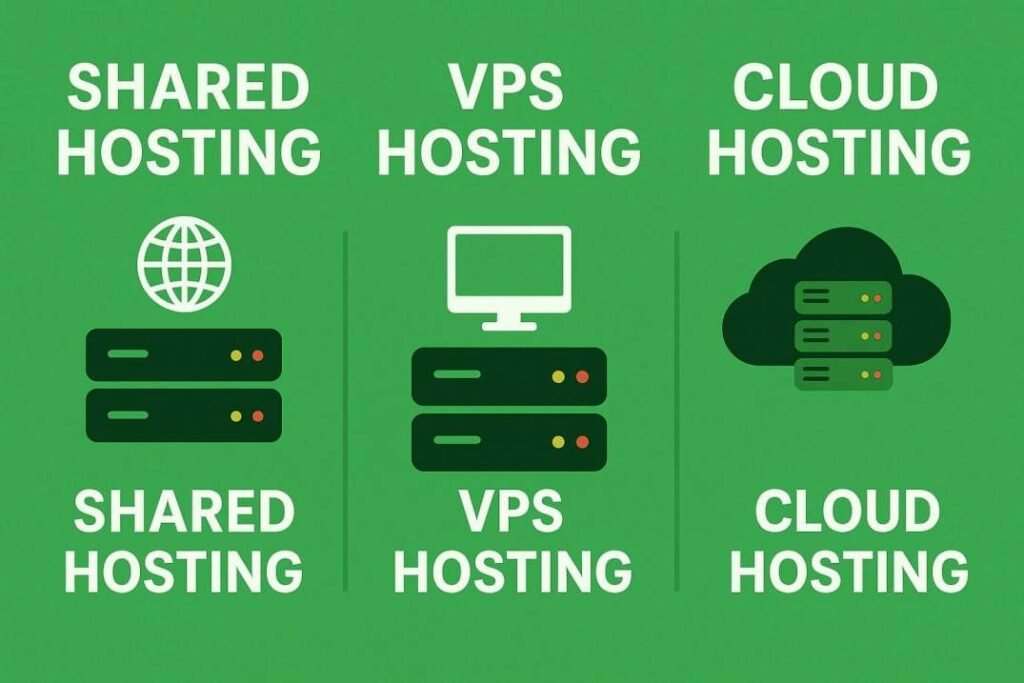Shared Hosting vs VPS vs Cloud Hosting
When it comes to launching a website, choosing the right hosting solution is one of the most important decisions you’ll make. The hosting type you choose affects your website’s performance, security, scalability, and cost. Among the most popular options are Shared Hosting, VPS (Virtual Private Server), and Cloud Hosting. Each has its strengths and weaknesses, and the best choice depends on your needs, budget, and long-term goals.
In this detailed guide, we’ll explain what each hosting type is, how it works, their pros and cons, pricing, and which one is best for different scenarios. By the end, you’ll have a clear idea of which hosting solution fits your website.

Affordable and Best Web Hosting
What is Shared Hosting?
Shared Hosting is the most common and budget-friendly type of web hosting. In shared hosting, multiple websites are hosted on the same physical server and share its resources such as CPU, RAM, and storage.
Think of it like living in an apartment building where you share the facilities with other residents. While you have your own space (your website), the resources like electricity and water (server resources) are shared by everyone.
How it works:
- The hosting provider sets up a server with multiple user accounts.
- Each account hosts several websites.
- All websites share the same resources like bandwidth and storage.
Pros of Shared Hosting:
- Affordable: Ideal for beginners and small websites.
- Easy to use: Comes with user-friendly control panels like cPanel.
- Maintenance handled by the host: The hosting provider takes care of server management, updates, and security.
Cons of Shared Hosting:
- Limited resources: If one site consumes too much bandwidth, others are affected.
- Performance issues: High traffic on other websites can slow yours down.
- Limited control: You can’t customize the server environment much.
Best for:
- Personal blogs, small business websites, and portfolios with low traffic.
What is VPS Hosting?
VPS Hosting (Virtual Private Server) offers a middle ground between shared hosting and a dedicated server. In VPS, a single physical server is divided into multiple virtual servers using virtualization technology. Each virtual server acts like an independent server with its own resources.
How it works:
- The hosting company uses virtualization to split a physical server into isolated environments.
- Each VPS has dedicated resources like RAM, CPU, and storage.
- You get root access and can install custom software.
Pros of VPS Hosting:
- More control: Root access for server customization.
- Better performance: Dedicated resources ensure stable performance.
- Scalable: Can easily upgrade resources as your website grows.
Cons of VPS Hosting:
- More expensive than shared hosting: Though cheaper than dedicated hosting, it’s still a cost upgrade.
- Requires some technical knowledge: Managing a VPS is more complex.
Best for:
- Growing websites, e-commerce stores, and businesses that need better speed and security.
What is Cloud Hosting?
Cloud Hosting is a modern hosting solution that uses multiple interconnected servers to host your website. Unlike shared or VPS hosting, which relies on one physical server, cloud hosting spreads your website’s resources across several servers in the cloud.
How it works:
- Your site’s files and data are stored on multiple servers.
- When one server fails, another automatically takes over, ensuring uptime.
- Resources are allocated on-demand, so you only pay for what you use.
Pros of Cloud Hosting:
- High reliability: No single point of failure.
- Scalability: Instantly scale resources based on traffic.
- Better performance: Resources from multiple servers ensure speed and uptime.
Cons of Cloud Hosting:
- Cost can vary: Pay-as-you-go model may become expensive for high-traffic sites.
- Complexity: Managing cloud environments requires technical understanding.
Best for:
- Websites with fluctuating traffic, large businesses, or apps requiring high availability.
Shared Hosting vs VPS vs Cloud Hosting: Key Differences
| Feature | Shared Hosting | VPS Hosting | Cloud Hosting |
|---|---|---|---|
| Cost | Cheapest | Moderate | Variable |
| Performance | Low (shared resources) | High (dedicated resources) | Very High (scalable) |
| Scalability | Limited | Moderate | Excellent |
| Security | Basic | Strong | Very Strong |
| Control | Minimal | Full (root access) | High (depends on plan) |
Pricing Comparison
- Shared Hosting: $2 – $10/month
- VPS Hosting: $20 – $80/month
- Cloud Hosting: $10 – $300/month (depending on usage)
Which Hosting is Best for You?
- Choose Shared Hosting if: You’re just starting with a personal blog or small business site.
- Choose VPS Hosting if: You have a growing business or e-commerce site that needs better performance and control.
- Choose Cloud Hosting if: You need maximum uptime, scalability, and performance for high-traffic or enterprise websites.
SEO Impact of Hosting
Your hosting choice can affect SEO indirectly. Factors like website speed, uptime, and security influence user experience and search rankings. Shared hosting may cause slower speeds, whereas VPS and cloud hosting usually provide better performance.
FAQs for Shared Hosting vs VPS vs Cloud Hosting – Which is Best?
What is shared hosting and who should use it?
Shared hosting is a type of web hosting where multiple websites share the same server and its resources. It’s best for beginners, personal blogs, and small business websites with low traffic because it’s affordable and easy to use.
What is VPS hosting and why is it better than shared hosting?
VPS hosting stands for Virtual Private Server hosting. It offers dedicated resources and better control compared to shared hosting. It’s more secure and provides better performance, making it ideal for growing websites, e-commerce stores, or businesses that need stability.
What is cloud hosting and how does it work?
Cloud hosting uses multiple interconnected servers to host your website instead of relying on a single server. This means your website stays online even if one server fails. It’s highly scalable, reliable, and perfect for high-traffic websites or businesses that need flexibility.
Which is the most affordable hosting option?
Shared hosting is the cheapest option, usually starting from $2 to $10 per month. It’s ideal for beginners and small websites with limited budgets.
Which hosting is best for scalability?
Cloud hosting is the best option for scalability because you can instantly upgrade resources based on traffic demands without downtime.
Is VPS hosting good for e-commerce websites?
Yes, VPS hosting is an excellent choice for e-commerce websites because it provides dedicated resources, better performance, and strong security compared to shared hosting.
Does the type of hosting affect SEO?
Yes, hosting can indirectly affect SEO. Factors like website speed, uptime, and security impact search rankings. VPS and cloud hosting generally perform better than shared hosting for SEO purposes.
Which hosting is the fastest?
Cloud hosting is generally the fastest because it uses multiple servers and allows resources to be scaled instantly for high performance.
Can I upgrade from shared hosting to VPS or cloud later?
Yes, most hosting providers allow you to upgrade from shared hosting to VPS or cloud hosting as your website grows and needs more resources.
Which hosting type offers the best security?
Cloud hosting and VPS hosting provide better security compared to shared hosting because they offer isolated environments and more control over server configurations.
Final Thoughts
The best hosting depends on your needs, budget, and future plans. Shared hosting is great for beginners, VPS hosting is ideal for scaling businesses, and cloud hosting is perfect for high-traffic, mission-critical websites.
Recent Post
| Related Posts | Link |
|---|---|
| What Is Web Hosting and How Does It Work? | Click Here |
| What Is a Website? (Beginners’ Guide) | Click Here |
| Best Platforms for Website Design in 2025 | Click Here |





